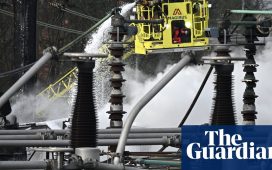‘We’ve all accepted that the North Sea is declining,” says Roy, 70, a taxi driver working in Aberdeen for the past 20 years. “Over the years there have been a few huge market crashes but we always recover. This time, it’s a real decline.”
Drive along the granite city’s Union Street and there are dozens of shuttered shops, some empty for almost a decade following one of the longest routs in the history of the oil market, which brought oil prices to lows of less than $30 (£23) a barrel in 2016, less than half its value today.
The capital of the UK’s oil and gas industry has weathered the volatility of the global oil markets since the North Sea heyday in the 1970s; its fortunes tied to the rise and fall of the price of Brent crude. But it is now less than two weeks away from a reckoning with the chancellor, Rachel Reeves, who many expect to set out tax changes in the budget that could hasten the end of the North Sea industry and threaten the 200,000 jobs it supports.
“They’re killing us,” says Darren, 50, an oil rig worker for the past 22 years. He declines to give his full name for fear of losing his job with a major oil company. “This government is going to do to the North Sea what Margaret Thatcher did to the mines. We all know it: this is the end for the UK oil industry. We just don’t know when.”
The Labour party stormed to power in July with bold plans to end Britain’s fossil fuel legacy and emerge as a “clean energy superpower”. Within days of forming a government, the party confirmed the UK would bring an end to new licences for oil and gas projects.
The decision has cemented Britain’s climate leadership in a crucial decade for tackling rising carbon emissions – but this is cold comfort for workers such as Darren, a father of two, who fear for the future of their industry.
“Imagine losing your job, losing the roof over your kids’ heads, and all to save carbon emissions that are a drop in the ocean compared to China’s? The best I can hope for is to hang on and perhaps in four years this government will be voted out,” he says.
‘A multibillion-pound paradox’
Alongside plans to ban new oil and gas licences, Labour came to power with an election pledge to toughen the windfall tax regime put in place after a surge in market prices following Russia’s invasion of Ukraine. It promised to raise the energy profits levy by increasing the headline tax rate companies pay on their oil and gas profits by three percentage points, to 78%.
Labour plans to use the higher taxes taken from the North Sea to help fund its ambition to turn the UK into a green energy “superpower” in line with its goal of making the UK’s electricity system net zero by 2030.
The party also promised to close the “loophole” left by the previous government that enabled oil and gas firms to reduce their taxes through investment allowances. These allowances, which are commonplace in tax legislation, allow companies to deduct the value of their investments from their profits – enabling companies to pay less tax and offering incentive for further investment.
The combined impact of higher headline taxes and lower tax relief risks devastating the sector’s predicted investment over the second half of this decade, according to the industry’s trade association, Offshore Energies UK (OEUK). It has warned that the changes could wipe out £12bn in tax receipts and jeopardise 35,000 industry jobs.
Stifel, an investment bank, believes that while the move would increase Treasury revenues in the short term, the wider economic impact would mean a sharp decline in takings from 2029 and the loss of 100,000 jobs in total.
“There is a multibillion-pound paradox here,” the bank said in a research note this year. “Any further increases to the windfall tax take, especially through the removal of investment allowances, would result in substantially lower investment and, therefore, lower tax income for the UK, fewer jobs, loss of skills for the green transition, higher emissions, and the export of jobs, skills and the UK’s energy security to other energy-producing countries.”
The Aberdeen Chamber of Commerce has warned that the spectre of Labour’s budget is being felt far beyond the energy sector. Its most recent quarterly economic survey of more than 5,000 companies showed that concerns over taxation had rocketed up the risk register; more than 60% of companies in the north-east of Scotland have cited the government’s tax policies as a barrier to growth, up from 48% just three months ago.
“The Treasury understands the potential impact,” says Russell Borthwick, the chamber’s chief executive. “But I do wonder if they’ve painted themselves into a difficult corner with these policies.”
“The fact is, there are no windfall profits being made in the North Sea today. There was a short period of time when Russia invaded Ukraine and there were oil prices above $100 a barrel. But Celtic Football Club made bigger profits than our largest North Sea oil producers last year. It looks like they’re now being singled out for political reasons, rather than fiscal reasons,” he says.
The wider regional economy is still “inextricably linked to the oil and gas economy”, which means the knock-on effect “will be felt from professional services to the retail industry to cab drivers. It will be more marked here than anywhere else.”
Gabby Robertson, 24, has worked in high-street fashion stores for four years and has noticed the decline of Aberdeen’s retail sector, which was once flush with oil and gas money.
“We used to have people come in and spend £400 to £500, but we see that a lot less now. People are coming in to buy single items or they tell us they’ll have to come back at payday and ask about paying on Klarna (the buy now, pay later platform). It’s still better here than on Union Street. Shops there have closed and there’s nothing to replace them. It’s getting harder and harder for small businesses to survive,” she says.
Economic catastrophe is not inevitable. Most of the gloomier projections cited by the industry assume that all investment allowances will be scrapped, although this has not been explicitly proposed by the government. The industry is hoping that some allowances remain intact to help prolong investment in the declining industry and allow its workers the chance to transition to Britain’s low-carbon future.
‘Where is the transition?’
At a busy heliport near Aberdeen airport, dozens of rig workers wait to board the helicopters that will take them up to 100 miles off the Scottish coast to the giant oil and gas platforms that extract the UK’s fossil fuels.
Most will work 12- to 13-hour days offshore for three weeks, before returning to their homes in Scotland and the north of England for a three-week break. On this grey October day, bad weather has kept many helicopters on the ground, and talk of the government’s upcoming budget has darkened the mood.
One oil rig worker, aged 53, who asked not to be named, has travelled to Aberdeen from his home in Lincolnshire each month for the past 30 years to work in the North Sea. After only a five-day break, he has returned for a one-week stint as part of his plan “to fit in more work while it’s around”.
“If Rachel Reeves does increase taxes for the North Sea then that’s another hit to the pockets of the oil companies that operate here. Harbour Energy, one of the biggest players, let 350 people go as part of a restructuring last year. I had hoped to keep working until I’m 60 but if I can get another five years I should be OK,” he says.
“It’s definitely the beginning of the end,” says Bob, 52. “Platforms that could have kept producing for years longer will shut. The one I work on will close in two years. It’s been 12 years that I’ve been working on the rigs after the refinery I worked at was left to close. I’ll be OK because I’ve had a long career but I think about the guys with young families who could lose their jobs and it just doesn’t seem right.
“It seems crazy to me that the North Sea faces windfall taxes but the likes of Amazon can get away with paying very little. Shouldn’t it be the same for all companies across the country? Isn’t that fair?”
Paul, a rig worker from Dundee, is one of many who fear that Britain’s plans to transition to a green economy will leave behind those who helped to build the fossil fuel economy of the past. “What I would ask the government is this: what’s the proposed solution to the problem that all this is going to create? They talk about a green transition but where’s the transition for us? All I hear is ‘woke’ jargon.”
The government’s plan to safeguard a “just transition” for Britain’s fossil fuel workers took a step forward last week with plans to launch a “skills passport” to help oil and gas workers to move into jobs in renewables such as offshore wind. From early next year, the passport, which will be overseen by industry bodies RenewableUK and OEUK, with the support of the UK and Scottish governments, aims to align standards, recognise transferable skills and qualifications such as oil and gas safety standards, and map out career pathways for suitable roles.
About 90% of oil and gas workers have transferable skills for offshore renewable jobs, according to OEUK – but not everyone is eager to make the switch. Barry, an oil worker in his late 30s, says he has “absolutely no interest” in retraining to work in Britain’s burgeoning offshore wind sector. For a start, the work is seasonal – with most maintenance taking place in the summer months. The pay is also not quite as good, he says.
“And it’s just not for me, I don’t like heights,” he shrugs. “If I had plans to stay in the North Sea I’d be worried. But I think I’m going to go out to work in Qatar. I’m not the one you need to worry about; I can leave the North Sea and work somewhere else. These big oil companies can leave the North Sea and work somewhere else. But the services firms – the supply chains serving the North Sea – which can’t leave are the ones who are going to feel the pain.”
A green Aberdeen?
Like many oil workers, larger supply chain and oilfield service firms have already begun to eye the new oil and gas frontiers in the Middle East, Africa and South America as the UK’s reserves dwindle.
The loss of skills and resources that could be put to use helping to meet the UK’s green energy ambitions is a major concern for industry observers. At the same time, smaller firms without an international reach risk going bust if the gap between the end of Britain’s fossil fuel era and the full economic benefits of its green future becomes too wide.
“I don’t think I’ve ever seen an issue unite the trade unions, businesses, public sector and academics quite like this one,” Borthwick says. “We’re in danger of losing our industrial supply chains to overseas oil and gas projects before there’s a chance for them to benefit from the opportunities of the green economy.”
The answer, according to Borthwick, is to allow more breathing room for the oil companies to keep investing in their existing projects while the industry winds down, while speeding up the green agenda to provide a future for the region’s small businesses.
The government’s public energy company, GB Energy, which will be headquartered in Aberdeen, could use its “convening power” to build a home for green industries in the city, he says. “We want that ecosystem. We want green companies to believe that Aberdeen is the place that they need to be.”
Reimagining Aberdeen as a green hub could prove to be the next chapter for a city uniquely poised at the centre of Britain’s energy transition. It is a reinvention the city is ready for, says Borthwick.
“You know, Aberdeen used to be a very serious place; but we’re changing. We’ve started to break out of the greyness of our granite past. It’s like we’re waking up. We’re relearning who we are,” he says.











